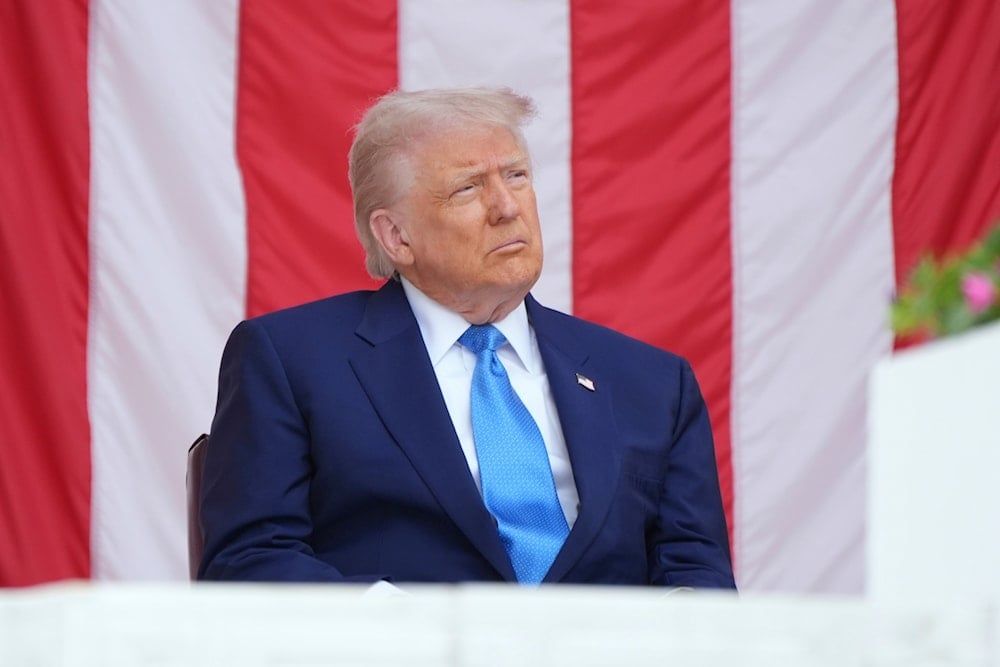Trump issues pardons; political allies, rapper, ex-gang boss included
Trump grants clemency to over two dozen people, bypassing DOJ vetting norms.
-

President Donald Trump listens during the 157th National Memorial Day Observance at Arlington National Cemetery, Monday, May 26, 2025, in Arlington, Va (AP)
In a fresh display of his unconventional use of presidential power, Donald Trump issued clemency to over two dozen individuals on Wednesday, including political allies, a prominent rapper, and a convicted gang leader.
The latest wave of Trump clemency decisions reflects a continued departure from traditional Department of Justice vetting procedures, as the former president rewards supporters and loyalists in his orbit.
Among the most controversial figures to benefit from Trump’s latest clemency spree is Larry Hoover, co-founder of the Gangster Disciples, once one of Chicago’s most powerful criminal organizations.
Hoover’s commutation does not erase state murder charges that will keep him incarcerated, but it may allow his transfer out of a supermax prison.
Trump pardons political allies, controversial public figures
The clemency list includes several political figures who have expressed support for Trump or mirrored his claims of unfair prosecution. Former Republican Congressman Michael Grimm, convicted of felony tax evasion, was pardoned.
Grimm had previously defended Trump on television and was described by Trump allies as a victim of politically motivated prosecution.
Trump also pardoned Julie and Todd Chrisley, reality TV personalities convicted of tax evasion and bank fraud. Their daughter, Savannah Chrisley, had defended Trump publicly, claiming her parents were targeted due to their conservative beliefs.
YoungBoy Never Broke Again (Kentrell Gaulden), a Louisiana rapper who pleaded guilty to weapons charges, also received a Trump pardon. In a statement, Gaulden thanked Trump for the clemency, saying it gave him a chance to continue growing as an artist and father.
The case marked another moment in Trump’s effort to appeal to Black male voters, echoing tactics from his previous campaign.
Larry Hoover commutation draws national attention
Trump’s commutation of Larry Hoover's federal sentence reignites national debate about presidential clemency and criminal justice reform. Hoover, known as “King Larry", has served decades for his role in organizing one of the most violent and expansive drug trafficking networks in the country.
Though his federal charges are now commuted, state-level murder convictions mean Hoover remains incarcerated.
According to Trump advisors, the clemency was pushed by figures involved in previous criminal justice advocacy campaigns. While some viewed it as a potential reform gesture, others criticized it as politically opportunistic.
As he has done in previous rounds of clemency, Trump circumvented the conventional review process and relied on advisors like Alice Johnson, a former inmate he previously pardoned and who now serves as a “pardon czar".
The phrase “No MAGA left behind,” posted by Trump advisor Ed Martin earlier in the week, underscored the president’s approach to clemency as both strategic and transactional.
Also on the list
Also on the clemency list are:
- Jeremy Hutchinson, ex-Arkansas senator convicted of tax fraud and bribery. His legal team claimed he was targeted for being a high-profile conservative
- Michael Harris, Death Row Records co-founder, serving a lengthy sentence for conspiracy to commit first-degree murder
- John Rowland, former Connecticut governor, twice convicted of public corruption
- Charles Tanner, a former boxer, serving a life sentence for cocaine distribution. Previously commuted by Trump in 2020
Other names featured in Trump’s clemency rollout included figures from across business and public life, such as:
- Florida divers Taylor Mansell and John Moore were pardoned after being convicted of removing sharks from a government fishing line; they argued they were intervening against illegal poaching
- James Callahan, a New York labor union leader convicted of failing to report over $300,000 in gifts
- Alexander Sittenfeld, a Cincinnati city councilman convicted of bribery and extortion
- Earl Lamont Smith, an Army Reserve sergeant who sold government property
- Marlene and James Kernan, sentenced to probation for employing a felon
Several other individuals received commutations, including Imaad Zuberi, a venture capitalist and Trump donor convicted of violating campaign finance and lobbying laws, as well as Larry Duran, Anabel Valenzuela, and others whose fraud-related cases received sentence reductions.
Legacy of transactional clemency
Trump’s clemency record has drawn intense scrutiny for favoring those with media visibility, political connections, or personal loyalty. In many cases, these actions have bypassed the DOJ’s traditional evaluation pipeline, reinforcing his unique approach to power and presidential privilege.
Critics argue that Trump’s use of clemency has undermined institutional norms, while supporters claim it represents a bold redefinition of justice aligned with voter grievances and political loyalty.

 4 Min Read
4 Min Read










